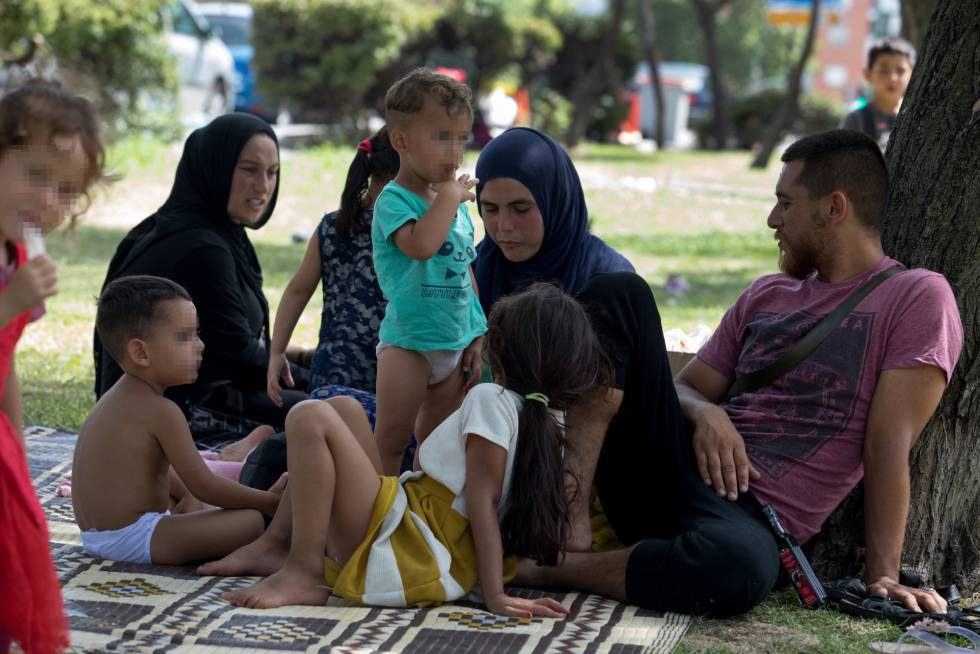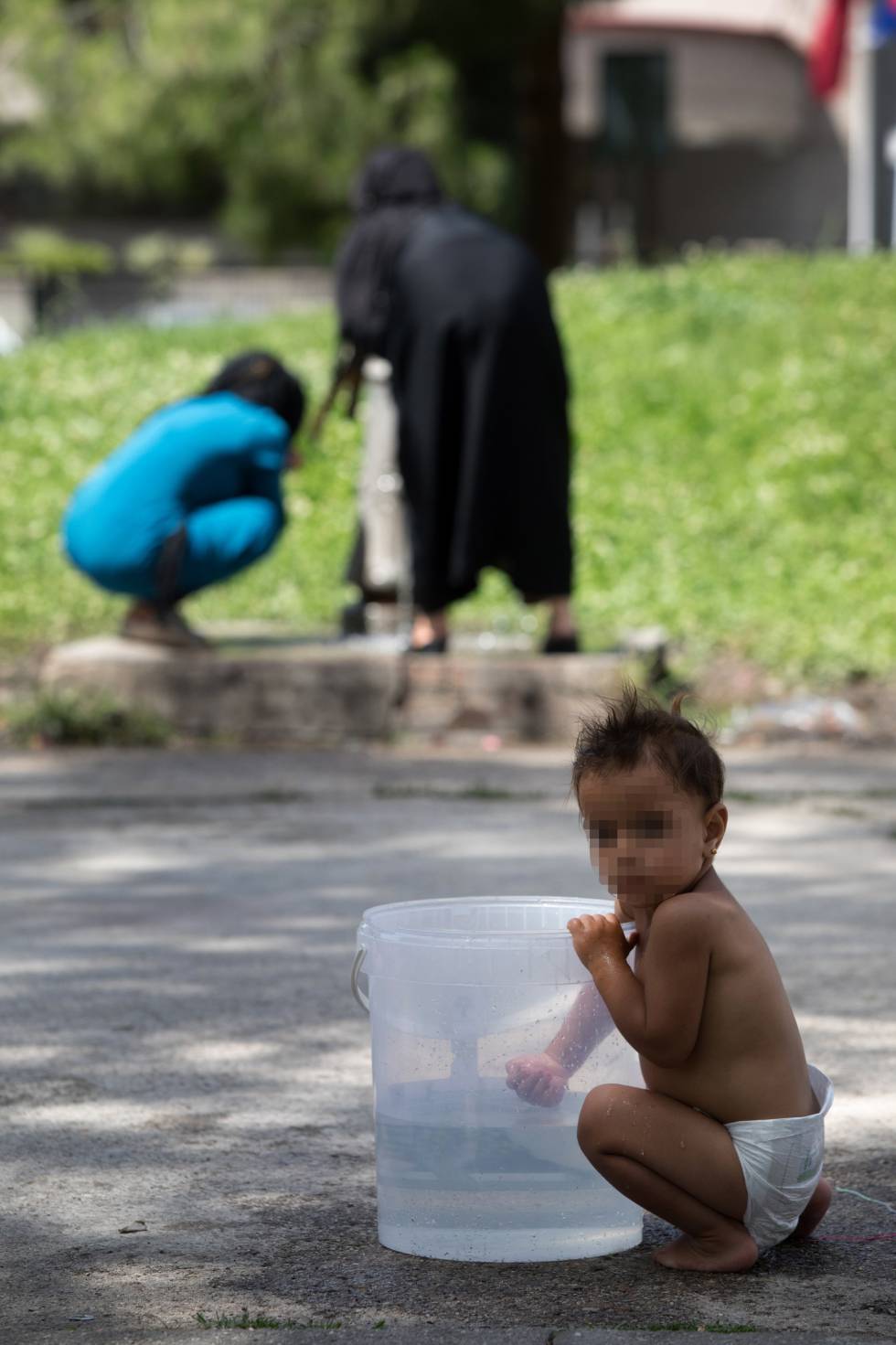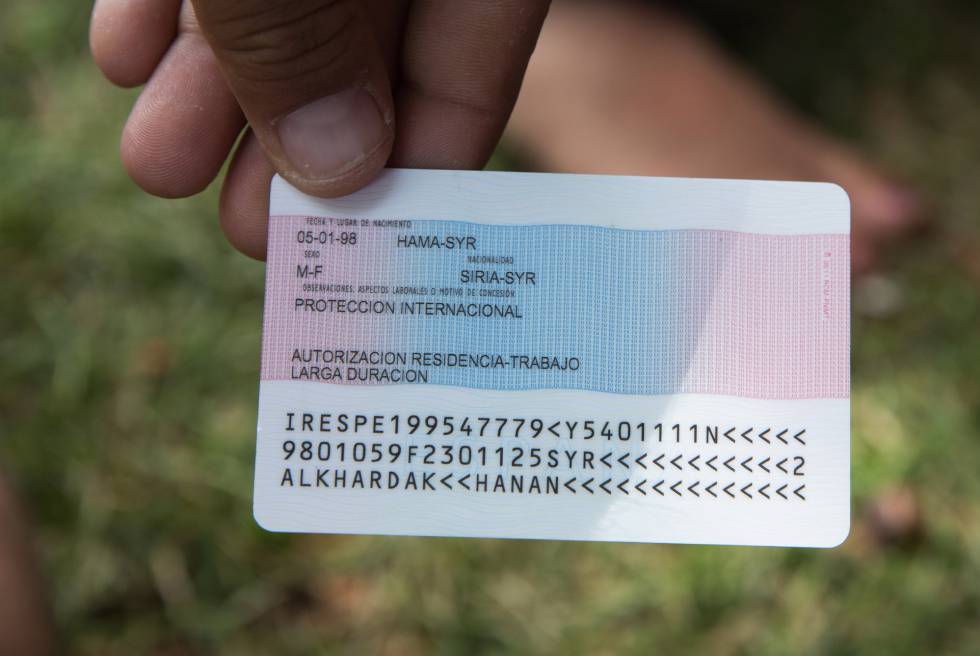After a seven-year odyssey, Syrian families end up living in a Madrid park
Unable to speak Spanish or understand the paperwork they need to get help, this group of 50 people, including pregnant women and minors, feels abandoned by the system
Madrid

The Syrian refugees in a Madrid park. VÍCTOR SAINZ
Around 50 Syrians, including 20 minors and four heavily pregnant women, have been living since July 10 in a public park in Madrid. This situation is common in the countries that border Syria, and which are currently housing the large majority of the 5.7 million refugees who have fled the war-torn country. But the sight in the Spanish capital of women chopping garlic and cooking vegetables over a camping gas stove is far from normal. A few meters away, some of the children are washing their younger siblings in a public fountain or in improvised bathtubs made of plastic. Clothes are drying on shrubs while a stone’s throw away, a group of men stare intently at a bunch of wrinkled documents.
“What dignity do I have left if I can’t even shower for days on end?” 50-year-old Mohamed, the patriarch of the group, asks angrily. Once he falls silent, the rest of the men talk over one another to recount their seven-year odyssey since they left Hama, their native city in the west of Syria, aware that the war would soon end up on their doorstep.
Where are the human rights in Europe?
SYRIAN REFUGEE IN MADRID
For the first five years, they alternated between Arab countries, barely surviving in tents in Lebanon and battered rental housing in Algeria and Morocco. They held temporary jobs in the latter country, then in August 2017 they crossed illegally into Melilla, one of Spain’s exclave cities in North Africa. “We ran out of money,” explains Mohamed, who, like the rest of the men in the group, used to make dental implants in his home country. “We paid the traffickers €300 per person and as soon as we stepped on Spanish soil we requested asylum,” he explains.
From there they were taken to Madrid and housed in a reception center. A few months later, encouraged by relatives, they decided to voluntarily leave that site without warning and head to France. “We found an abandoned house on the outskirts of Paris, which we cleaned up so that we could live in it,” Mohamed explains. The women nod along, seemingly nostalgic for the best dwelling that they have had since they had to leave behind their beds, washing machines and refrigerators.
“My children went to school, the women gave birth in hospitals, and they gave us benefits of €500 to €800 a month per family,” explains Arma, the wife of Mohamed and a mother of 10. They worked too, in the informal economy.

But after two years, the French police told them that “in a few days” they would be returned to Spain. The 15 Syrian families don’t understand that the reason was down the implementation of the Dublin Regulation, under which Syrian refugees are being returned to the European countries that they set foot in the first time they requested asylum. Without waiting for the French authorities to return, they made the journey back to Madrid, where they ended up in Salvador de Madariaga park, located in the northeast of the Spanish capital next to the M-30 beltway.
The story of this group is being repeated among dozens of families who are being “returned” to Spain as the application of the Dublin Regulation is stepped up. There appears, however, to be no mechanism for the accompaniment of asylum seekers, and no coordination between the European countries. Caught up in the bureaucracy of the Spanish and European systems, and with no knowledge of the language, they end up being spat out in the streets of Madrid. Last month, the San Carlos Borromeo church, located in the working-class Madrid neighborhood of Vallecas, opened its doors once more to take in 11 Syrians and Palestinians who had been returned from Germany. At the same time, the frustration and disappointment of these refugees with Europe is increasing as the years pass by.
Over the last few weeks, two police patrols have shown up, according to both nearby residents and the Syrians themselves, but no one from the Labor and Migration Ministry has stopped by. “After showing our documentation, the police said that they wanted to take our children, because they are minors sleeping in the street. And they said nothing more,” explains Abdel Razzik, 27, a father of two. The refugees refused and asked instead to be provided with accommodation.

In December 2018, the Madrid Provincial Court passed a sentence stating that asylum seekers who voluntarily leave Spain will not be excluded from the protection system upon their return. The ruling states that “priority will be given for reinsertion into the reception system to vulnerable profiles.” These profiles include pregnant women and families with minors, as is the case for the 15 families currently camped out in the Salvador de Madariaga park.
Of the four pregnant Syrian women, only Barguta al Ahmed, 20 and mother of a young boy, has been seen by a doctor. “What does it say here?” asks the women in the middle of her interview with EL PAÍS, pulling out a piece of paper with a medical appointment from a local hospital. Barguta says that she is in her seventh month of pregnancy. The ultrasound report that is stapled to the piece of paper, the contents of which Al Ahmed is unaware of, says that she is actually in her ninth month. During the few nights when it rains, she sleeps in a small plastic tent. During the day she avoids the heat as best she can underneath the trees.
The choice of this park was almost instinctual for these Muslim refugees, given that they feel more protected thanks to being just a stone’s throw from the M-30 Mosque. They are allowed to use the bathrooms in there, but cannot spend the night within the building. “They told us it is prohibited,” one of them explains.
The choice of this park was almost instinctual for these Muslim refugees, as it next to the M-30 mosque
When questioned by EL PAÍS, the director of the Islamic Cultural Center, Sami al Mishtawi, explained that they “preferred not to interfere” with the situation, but that they will “see what can be done.” In the meantime, support has been arriving from their Spanish neighbors and the Muslims who come to the mosque on Fridays at prayer time. One of them brings a box of peaches, while others bring toys for the children. Aside from the antics of the youngest kids, one young girl cries nonstop, apparently due to “a really bad toothache.”
“Where are the human rights in Europe?” asks one man angrily. His impotence at seeing his pregnant wife and children in the park day after day serves to feed his fury. The impossibility of speaking the language in order to take her to a hospital adds to the frustration. He is also aware that their presence bothers nearby residents who avoid crossing through the park, despite the family making every effort to keep the patch of grass where they are living clean and tidy.
The men pull out a number of papers and lay them out like a mosaic on the grass. Red cards, residency permits and protection documents are laid on top of legal claims that have been shelved due to non-attendance. None of them understands the content of the Spanish-language papers. Some of them don’t even know how to write in Arabic.
“We went to the police station and they asked us for a home address, which we don’t have. I’ve paid nearly €300 to arrange a residency permit for my family and the next free appointment is in three months,” explains Mohamed, who has now calmed down. In the Syrian embassy in Madrid, they say, they require the family to go back to Syria to get a family record and other up-to-date documents before they will issue passports for the newborns. “It’s madness!” says the patriarch.
English version by Simon Hunter.









.png)




























No hay comentarios:
Publicar un comentario